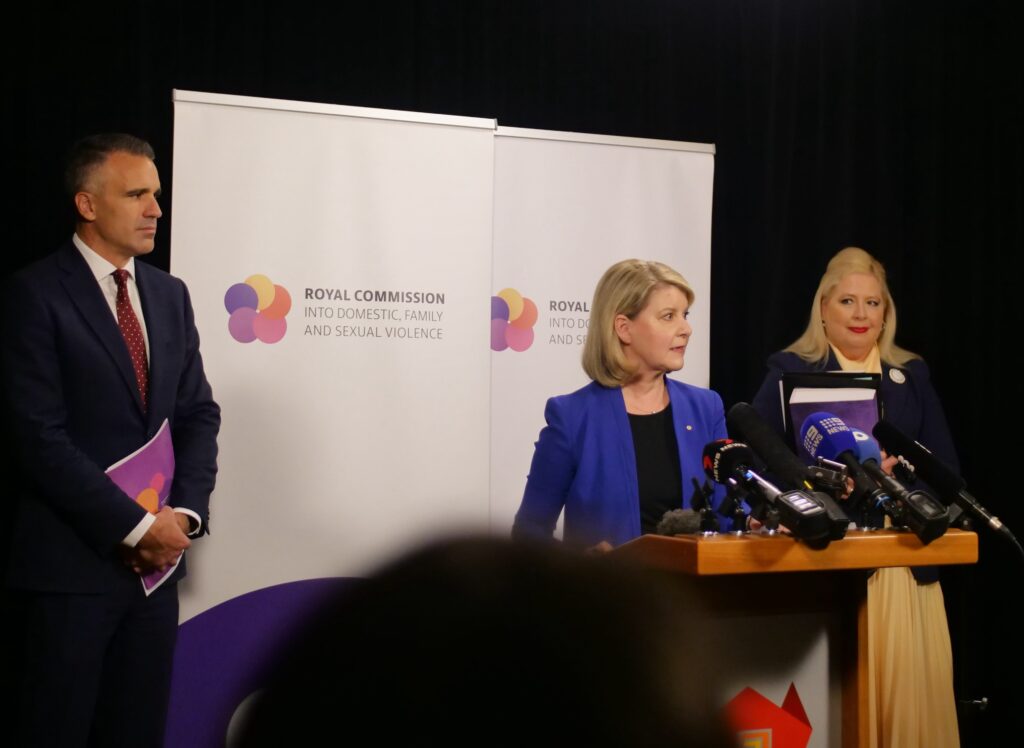The stories of domestic and family violence in South Australia are “harrowing” and “heartbreaking”, Commissioner Natasha Stott Despoja AO said on Tuesday.
Some of what Stott Despoja and her team heard during the state’s Royal Commission will haunt them forever.
Indeed, the background to calling for this Royal Commission is horrific to recall: in just one week in November 2023, four women were murdered in the state.
But there are reasons to hope that this statewide crisis can end.
As Stott Despoja said: “I’ve also derived a great deal of inspiration from the hope that’s out there, from those people who do actually have a vision of a South Australia that’s violence-free.”
That vision has now been distilled into 136 recommendations to deal with the statewide crisis, handed to the state government last week, and made public on Tuesday.
The Malinauskas Labor Government has already committed to implementing seven of the recommendations so far, including establishing a standalone ministerial portfolio for domestic, family and sexual violence and establishing a governance response for the government to examine and measure the impact of a state wide response. Several reforms are already in motion, including legislating to criminalise coercive control, and establishing domestic violence prevention and recovery hubs, and ringfencing new public housing for women escaping violence.
Overall, Stott Despoja was scathing of the state’s previous response to domestic and family violence.
She described services as underfunded, and the overall system as being “fragmented”, “crisis driven” and siloed in its response to the crisis.
She highlighted a lack of accountability, noting there was “no single point of leadership within the government for the domestic and family violence system, and without government stewardships or an accountability mechanism, no one is held responsible for when services fail people or fail to support victim-survivors.”
The report aims to ensure generational reform, setting out key themes including structural reform aimed at focusing on a cohesive and effective system, increasing awareness of the visibility of the issue (by investing in workforce, education, community awareness and the justice system), support for safe help-seeking and access to crisis repsonse, strengthing the focus on people who use violence through programs and legislative reform, building holistic support for surivors, and establishing a strong foundation for prevention.
Stott Despoja urged the South Australian government to “lead with courage” on ending domestic and family violence, following the release of the 700-page report With Courage: South Australia’s vision beyond violence and the accompanying Voices report.
The immediate response to the report indicates the government is willing to do so, especially in immediately moving to address accountability measures within the Cabinet and leadership. It’s agreed to adopt the initial seven recommendations that will establish a framework for responding to the report’s full recommendations.
Stott Despoja said she understands the government will need time to weigh up the recommendations, which have already been welcomed be advocates in the state, including Pay Our Respects co-founder Stacey Nelan who described feeling “optimistic” after reading the findings and noted recommendations around lived experience inclusion, Embolden CEO Mary Leaker whoe described the “momentous opportunity” ahead, and Fare Australia which has noted the calls for alcohol reform.
“I cannot thank enough those people who trusted me with their insights, stories and their time. It has been confronting and compelling, but I believe we have a blueprint for positive change,” she said.
Speaking on Tuesday, Premier Peter Malinauskas commended Commissioner Stott Despoja and the “brave South Australians who came forward to tell their stories.”
He described the stories he’d read as “harrowing”.
But he also noted the “hope” in the document. “It sets out a pathway to improve the way we respond to this scourge, and to prevent it from happening in the first place.”
He declared that, “today the work begins to respond to the 136 recommendation in a way to deliver that change strategically, methodically, and in a way that can deliver lasting change.”
South Australia’s Minister for Women, Katrine Hildyard, also spoke at the press conference on Tuesday and noted the “once-in-a-generation opportunity to build a system that protects, empowers and heals.”
“It encourages us to lead with purpose, patience and passion and we intend to do so,” she said.
“The seven recommendations we have initially accepted focus on building the framework and foundation to methodically, collaboratively and strategically drive long-term change.”
“I am more determined than ever to do so,” she said. “I am deeply moved by the courage of the survivors who came forward, by the Aboriginal people whose experiences are grounded in every aspect of the Royal Commission and will be central to our response and by the children and young people who are now finally heard.”
“We have listened and now we are acting.”
If you or someone you know is experiencing, or at risk of experiencing, domestic, family or sexual violence call 1800RESPECT on 1800 737 732, chat online via 1800RESPECT.org.au or text 0458 737 732.
If you are concerned about your behaviour or use of violence, you can contact the Men’s Referral Service on 1300 766 491 or visit www.ntv.org.au.
Feeling worried or no good? No shame, no judgement, safe place to yarn. Speak to a 13YARN Crisis Supporter, call 13 92 76. This service is available 24 hours a day, 7 days a week.
In an emergency, call 000.


